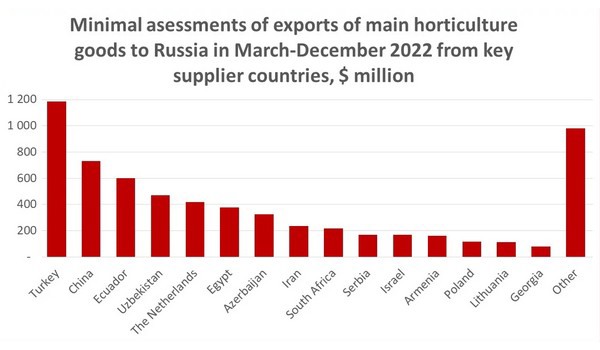In March 2022, EastFruit published an article calling on all companies to stop doing business with Russia. Many organizations, experts, and business representatives from many countries of the world made similar calls then. This had a significant effect because numerous multinational corporations and smaller companies stopped supporting the Russians.
McDonald’s sold its restaurants in Russia to a local company, Renault transferred its assets to a Russian state-owned corporation, Maersk divested itself of a joint venture in favor of a local partner, and many companies that respect their reputation and are unwilling to support the killing of Ukrainians have acted similarly.
Examples of fruit and vegetable corporations that have withdrawn from the Russian market or at least significantly reduced cooperation include McCain Foods from Canada (one of the global leaders in the French fries sector), Anecoop from Spain (one of the largest fruit and vegetable groups in Europe), Intercomm Foods from Greece. a major supplier of canned fruit), Olvi from Finland (beverage and juice market operator) and many other companies.
Nevertheless, even though trade in any goods with the aggressor state is an indirect and sometimes very direct support for the Russian army, Moscow supermarkets were full of imported vegetables and fruits, imported seeds and seedlings were used in the production of Russian products, and Russian goods were present in the markets of neighboring and distant countries.
February 24 of this year was the anniversary of the invasion of Russian troops into Ukraine, and now, in my opinion, we can assess which horticultural businesses listened to the requests and persuasions of an adequate part of humanity and stopped supporting the aggressor and which did not. In addition, import and export statistics for most countries of the world up to December 2022 are now available, allowing us to sum up the past year.
By the way, Russia itself has closed the access of international organizations to its statistics since February 2022, so the figures given in my blog are the minimum assessment of cooperation between other states and the Russian Federation in the fruit and vegetable sector and real numbers can be even higher.
 Key countries exporting fruits and vegetables to Russia in March-December 2022.
Key countries exporting fruits and vegetables to Russia in March-December 2022.
In other words, these are countries that supplied their products to Russia when it invaded Ukraine, thereby supporting the actions of the Russian army in an independent country. Such goods were used both directly in support of the aggressor’s army (for example, for army food or the production of dry rations) and indirectly because the way of goods from the Russian port to the kitchen of consumers involved the payment of import duties, taxes, and other fees, a large part of which is used to finance the army and military-industrial complex of Russia.
For more information: east-fruit.com
